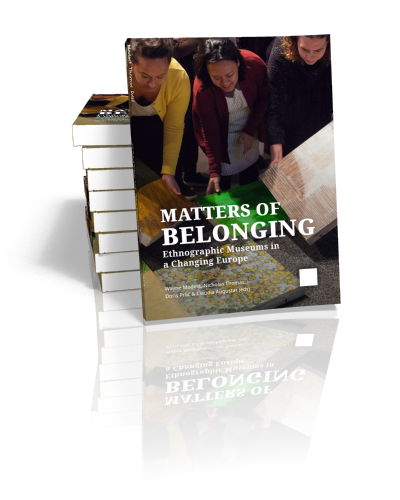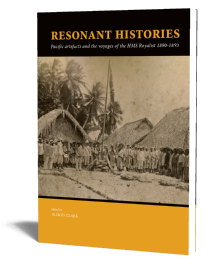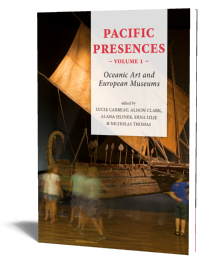Matters of Belonging
Ethnographic Museums in a Changing Europe
Edited by Wayne Modest, Nicholas Thomas, Doris Prlić & Claudia Augustat | 2019

Matters of Belonging
Ethnographic Museums in a Changing Europe
Edited by Wayne Modest, Nicholas Thomas, Doris Prlić & Claudia Augustat | 2019
Paperback ISBN: 9789088907777 | Hardback ISBN: 9789088907784 | Imprint: Sidestone Press | Format: 165x230mm | 226 pp. | Language: English | 16 illus. (bw) | 25 illus. (fc) | Keywords: museums of ethnography and world cultures, belonging, heritage, inclusion, creativity, colonialism, migration, anthropology | download cover
Read online or downloaded 2311 times
-
Digital & Online access
This is a full Open Access publication, click below to buy in print, browse, or download for free.
-
Buy via Sidestone (EU & UK)
-
Buy via our Distributors (WORLD)
For non-EU or UK destinations you can buy our books via our international distributors. Although prices may vary this will ensure speedy delivery and reduction in shipping costs or import tax. But you can also order with us directly via the module above.
UK international distributor
USA international distributor
-
Bookinfo
Paperback ISBN: 9789088907777 | Hardback ISBN: 9789088907784 | Imprint: Sidestone Press | Format: 165x230mm | 226 pp. | Language: English | 16 illus. (bw) | 25 illus. (fc) | Keywords: museums of ethnography and world cultures, belonging, heritage, inclusion, creativity, colonialism, migration, anthropology | download cover
Read online or downloaded 2311 times

We will plant a tree for each order containing a paperback or hardback book via OneTreePlanted.org.
Matters of Belonging brings to the foreground critical practices within ethnographic museums in relation to their diverse stakeholders, with a special focus on collaboration with artists and differently constituted, self-identified communities. This book emerges from the EU-funded project SWICH (Sharing a World of Inclusion, Creativity and Heritage) that places ethnographic museums at the centre of ongoing debates about Europe’s shifting polity and questions around heritage, citizenship and belonging. Addressing diverse political climates and citizenship regimes, legal frameworks and colonial/migratory histories, the articles seek to question the role of ethnographic and world cultures museums within contemporary negotiations of how to define Europe, Europeans, and European heritage, especially mindful of the region’s colonial and migratory pasts.
The book is neither celebratory nor congratulatory, and does not depict a triumphal overcoming by ethnographic museums of their troubled pasts. Its aim is to think critically about these museums’ responses, to identify both pitfalls and positive developments, and to sketch out possible futures for museums generally, and ethnographic museums specifically, as they try to locate themselves within discussions about Europe and its futures.
Central to the book’s argument is that it may exactly be in their entanglement with the colonial past that these museums can become important sites for thinking about colonial entailments in the present. Facing up to this past is the beginning of addressing these larger legacies. The authors suggest that the ethnographic museum has been the site not just for trenchant questioning of colonial durabilities in contemporary Europe, but also for the development of new practices – of collaboration and authority-sharing, of recognition and belonging. This book explores these models, not as complete, but as starting points to push forward new practices.
Acknowledgements
List of images
Introduction
Wayne Modest
Heritage
The Museum Inside-out – Twenty Observations
Nicholas Thomas
Museums and Source Communities: Reflections and implications
Laura Peers
Collaboration and the Dilemma of the Exotic: A Research Note
Barbara Plankensteiner
Our House is Made of Thin, Burning Ice. Let´s Dance
Sandra Ferracuti
Creativity
Questions of Belonging
Alana Jelinek
Love and Loss in the Ethnographic Museum
Rajkamal Kahlon
Eyes in the Back of Your Head
Bianca Baldi
I came as a Stranger
Aleksandra Pawloff
The Long Walk: Following the Tick Ticking Sounds into the Unknown – Or the Omitted
Jacqueline Hoàng Nguyễn
Inclusion
Shared Authority Matters: Collaboration with Heritage Bearers with Migrant Background
Tina Palaić and Bojana Rogelj Škafar
Uncomfortable Memory and Community Participation at the Barcelona Ethnological and World Cultures Museum
Salvador García Arnillas and Lluís-Josep Ramoneda Aigüadé
The Making of a Point of View: A Participatory Exhibition at the Pigorini Museum in Rome
Rosa Anna Di Lella – Loretta Paderni
Out of Boxes: Touching Wor(l)ds, Moving Pictures
Urban Nomad Mixes
For Contingent Collaboration: The Making of the Afterlives of Slavery exhibition at the Tropenmuseum
Rita Ouédraogo, Robin Lelijveld, Martin Berger, Richard Kofi, and Wayne Modest
Prof. dr. Wayne Modest
Wayne Modest is the Head of the Research Center for Material Culture, the research institute of the Tropenmuseum, Museum Volkenkunde, Africa Museum and Wereldmuseum in the Netherlands. He is also Professor of Material Culture and Critical Heritage Studies in the Faculty of Humanities at the Vrije Universiteit Amsterdam.
Prof. dr. Nicholas Thomas
Nicholas Thomas did doctoral research in the Marquesas Islands and has since written extensively on exploration and cross-cultural encounters and on art histories in the Pacific. He has been Director of the Museum of Archaeology and Anthropology in Cambridge since 2006.
Doris Prlić
Doris Prlić is coordinator of the European cooperation project SWICH – Sharing a World of Inclusion, Creativity and Heritage at Weltmuseum Wien (since January 2015). She previously worked as independent curator, realizing projects for different cultural organisations such as Festival der Regionen or afo – architekturforum oberösterreich (Linz, Austria).
Dr. Claudia Augustat
Claudia Augustat is curator of the South America collections at Weltmuseum Wien, Vienna, with a regional focus on Amazonia. In her research, she concentrates on topics such as material culture and cultural memory, collaborative projects as well as decolonization of museum practice. She is project leader of SWICH – Sharing a World of Inclusion, Creativity and Heritage (since January 2018).
Abstract:
Matters of Belonging brings to the foreground critical practices within ethnographic museums in relation to their diverse stakeholders, with a special focus on collaboration with artists and differently constituted, self-identified communities. This book emerges from the EU-funded project SWICH (Sharing a World of Inclusion, Creativity and Heritage) that places ethnographic museums at the centre of ongoing debates about Europe’s shifting polity and questions around heritage, citizenship and belonging. Addressing diverse political climates and citizenship regimes, legal frameworks and colonial/migratory histories, the articles seek to question the role of ethnographic and world cultures museums within contemporary negotiations of how to define Europe, Europeans, and European heritage, especially mindful of the region’s colonial and migratory pasts.
The book is neither celebratory nor congratulatory, and does not depict a triumphal overcoming by ethnographic museums of their troubled pasts. Its aim is to think critically about these museums’ responses, to identify both pitfalls and positive developments, and to sketch out possible futures for museums generally, and ethnographic museums specifically, as they try to locate themselves within discussions about Europe and its futures.
Central to the book’s argument is that it may exactly be in their entanglement with the colonial past that these museums can become important sites for thinking about colonial entailments in the present. Facing up to this past is the beginning of addressing these larger legacies. The authors suggest that the ethnographic museum has been the site not just for trenchant questioning of colonial durabilities in contemporary Europe, but also for the development of new practices – of collaboration and authority-sharing, of recognition and belonging. This book explores these models, not as complete, but as starting points to push forward new practices.
Contents
Acknowledgements
List of images
Introduction
Wayne Modest
Heritage
The Museum Inside-out – Twenty Observations
Nicholas Thomas
Museums and Source Communities: Reflections and implications
Laura Peers
Collaboration and the Dilemma of the Exotic: A Research Note
Barbara Plankensteiner
Our House is Made of Thin, Burning Ice. Let´s Dance
Sandra Ferracuti
Creativity
Questions of Belonging
Alana Jelinek
Love and Loss in the Ethnographic Museum
Rajkamal Kahlon
Eyes in the Back of Your Head
Bianca Baldi
I came as a Stranger
Aleksandra Pawloff
The Long Walk: Following the Tick Ticking Sounds into the Unknown – Or the Omitted
Jacqueline Hoàng Nguyễn
Inclusion
Shared Authority Matters: Collaboration with Heritage Bearers with Migrant Background
Tina Palaić and Bojana Rogelj Škafar
Uncomfortable Memory and Community Participation at the Barcelona Ethnological and World Cultures Museum
Salvador García Arnillas and Lluís-Josep Ramoneda Aigüadé
The Making of a Point of View: A Participatory Exhibition at the Pigorini Museum in Rome
Rosa Anna Di Lella – Loretta Paderni
Out of Boxes: Touching Wor(l)ds, Moving Pictures
Urban Nomad Mixes
For Contingent Collaboration: The Making of the Afterlives of Slavery exhibition at the Tropenmuseum
Rita Ouédraogo, Robin Lelijveld, Martin Berger, Richard Kofi, and Wayne Modest
Prof. dr. Wayne Modest
Wayne Modest is the Head of the Research Center for Material Culture, the research institute of the Tropenmuseum, Museum Volkenkunde, Africa Museum and Wereldmuseum in the Netherlands. He is also Professor of Material Culture and Critical Heritage Studies in the Faculty of Humanities at the Vrije Universiteit Amsterdam.
Prof. dr. Nicholas Thomas
Nicholas Thomas did doctoral research in the Marquesas Islands and has since written extensively on exploration and cross-cultural encounters and on art histories in the Pacific. He has been Director of the Museum of Archaeology and Anthropology in Cambridge since 2006.
Doris Prlić
Doris Prlić is coordinator of the European cooperation project SWICH – Sharing a World of Inclusion, Creativity and Heritage at Weltmuseum Wien (since January 2015). She previously worked as independent curator, realizing projects for different cultural organisations such as Festival der Regionen or afo – architekturforum oberösterreich (Linz, Austria).
Dr. Claudia Augustat
Claudia Augustat is curator of the South America collections at Weltmuseum Wien, Vienna, with a regional focus on Amazonia. In her research, she concentrates on topics such as material culture and cultural memory, collaborative projects as well as decolonization of museum practice. She is project leader of SWICH – Sharing a World of Inclusion, Creativity and Heritage (since January 2018).
-
Digital & Online access
This is a full Open Access publication, click below to buy in print, browse, or download for free.
-
Buy via Sidestone (EU & UK)
-
Buy via our Distributors (WORLD)
For non-EU or UK destinations you can buy our books via our international distributors. Although prices may vary this will ensure speedy delivery and reduction in shipping costs or import tax. But you can also order with us directly via the module above.
UK international distributor
USA international distributor
- Browse all books by subject
-
Search all books

We will plant a tree for each order containing a paperback or hardback book via OneTreePlanted.org.
You might also like:
© 2025 Sidestone Press KvK nr. 28114891 Privacy policy Sidestone Newsletter Terms and Conditions (Dutch)








